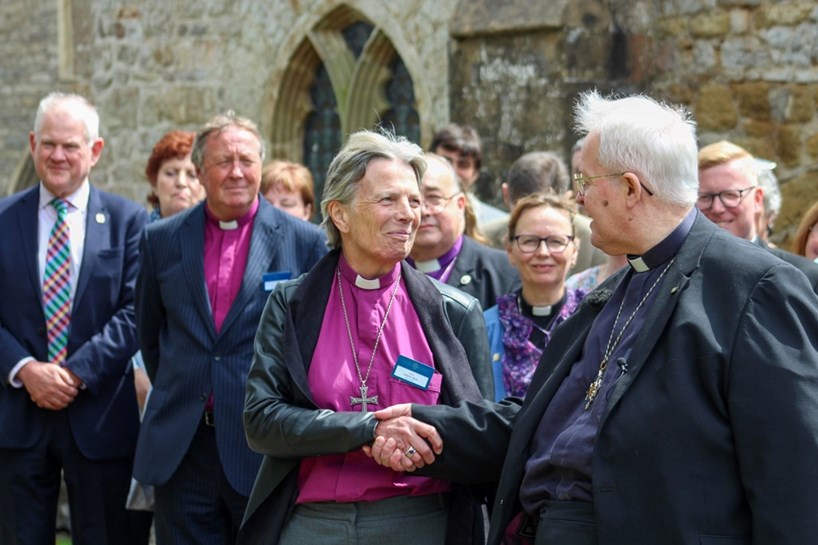THE Bishop of Monmouth, the Rt Revd Cherry Vann, is the new Archbishop of Wales.
She was elected on Wednesday, securing a two-thirds majority in the Electoral College on the second day of its meeting. The confirmation by the other diocesan bishops of the election makes her the first woman Primate in an Anglican Church in the UK. She remains Bishop of Monmouth, and will be enthroned as Primate in her cathedral in Newport in due course.
Bishop Vann moved to Wales five years ago. Her first 30 years of her ministry were in the diocese of Manchester, where she became Archdeacon of Rochdale in 2008.
She succeeds the Rt Revd Andrew John, who retired in July after three and a half years as Archbishop, and will retire as Bishop of Bangor at the end of August. He announced his resignation from the Primacy last month four days after making an unqualified apology for his part in failings at Bangor Cathedral. Two reports had recorded concerns about “weak financial controls” and “inappropriate behaviours” (News, 27 June).
After a succession of resignations or allegations about leaders in the Church in Wales Representative Body has announced that a “cultural audit” of the Church must take place (News, 4 July); and Archbishop Vann’s appointment marks the second time that she has been asked to take up a post in the wake of reports of dysfunction.
Her move to Monmouth was to succeed the Rt Revd Richard Pain after his long absence and subsequent retirement (News, 17/24 December 2021). This occurrence was described in a report commissioned by the Bishops as a “tragedy” and a “shock to the system” in which careers were “damaged and reputations left ruinous” (News, 6 May 2022).
On Wednesday, Archbishop Vann said: “The first thing I shall need to do is to ensure that the issues which have been raised in the last six months are properly addressed and that I work to bring healing and reconciliation, and to build a really good level of trust across the Church and the communities the Church serves.”
 Church in WalesThe Rt Revd Cherry Vann after her election as Archbishop in Wales
Church in WalesThe Rt Revd Cherry Vann after her election as Archbishop in Wales
Originally from Leicestershire, Archbishop Vann studied at the Royal College of Music before training for minisry at Westcott House. She was ordained deacon in 1989, serving in parishes in Bolton and outer Manchester and as a Higher Education chaplain in the area. In 1994, she was among the first women ordained priest, serving her title at St Peter, Bolton le Moors. From 1998 to 2004, she was Chaplain among Deaf People in Manchester diocese. She spent ten years as a parish priest in East Farnworth, Bolton.
A General Synod member, she was elected as Prolocutor in the Northern Province in 2013 and played a part in the instigation of Renewal and Reform and of Living in Love and Faith, and was appointed on the group to advise dioceses on “pastoral actions”.
She has been in a civil partnership with Wendy since 2015. She told the congregation at a Pride Cymru eucharist in St John’s, Cardiff, in 2021: “God has changed and transformed us through the gift of his love for one another.” The couple attended the 2022 Lambeth Conference together (News, 5 August 2022).
Between 2020 and 2023, Monmouth diocese underwent the pastoral reorganisation of 121 parishes into 16 ministry areas. Bishop Vann had warned that many congregations “have few if any members under 60: the life of the Church doesn’t look sustainable beyond a decade or so” (News, 26 January 2024).
On Wednesday, the Dean of Newport, the Very Revd Ian Black, said that she had “brought stability to the diocese of Monmouth, managing the change to ministry areas with clarity and purpose, showing deep care for the clergy and people. This foundation will be a good base as she leads the Province over the next few years.
“She has a deep faith, which is also open to those who take a different view to her, and this has impressed those people enormously.”
In recent months, Archbishop Vann has spoken with hope about the future of the Church in Wales. Welcoming the final report of the group set up to implement the Monmouth Inquiry’s recommendations, she said that the Bench of Bishops was “very different from the one I joined four years ago. . . We have set aside time to pray together, study scripture, and share openly and honestly with one another. . . We have learned to challenge each other appropriately.”
There remained “a need for all of us to hold one another to account and be held to account ourselves,” she said (News, 26 April 2024).
The office of Archbishop of Wales has existed since disestablishmet in 1920, when the Church ceased to be part of the Church of England. The new Archbishop is the third not to be born in Wales. In 2019, she told the South Wales Argus that she was hoping to learn Welsh.
















